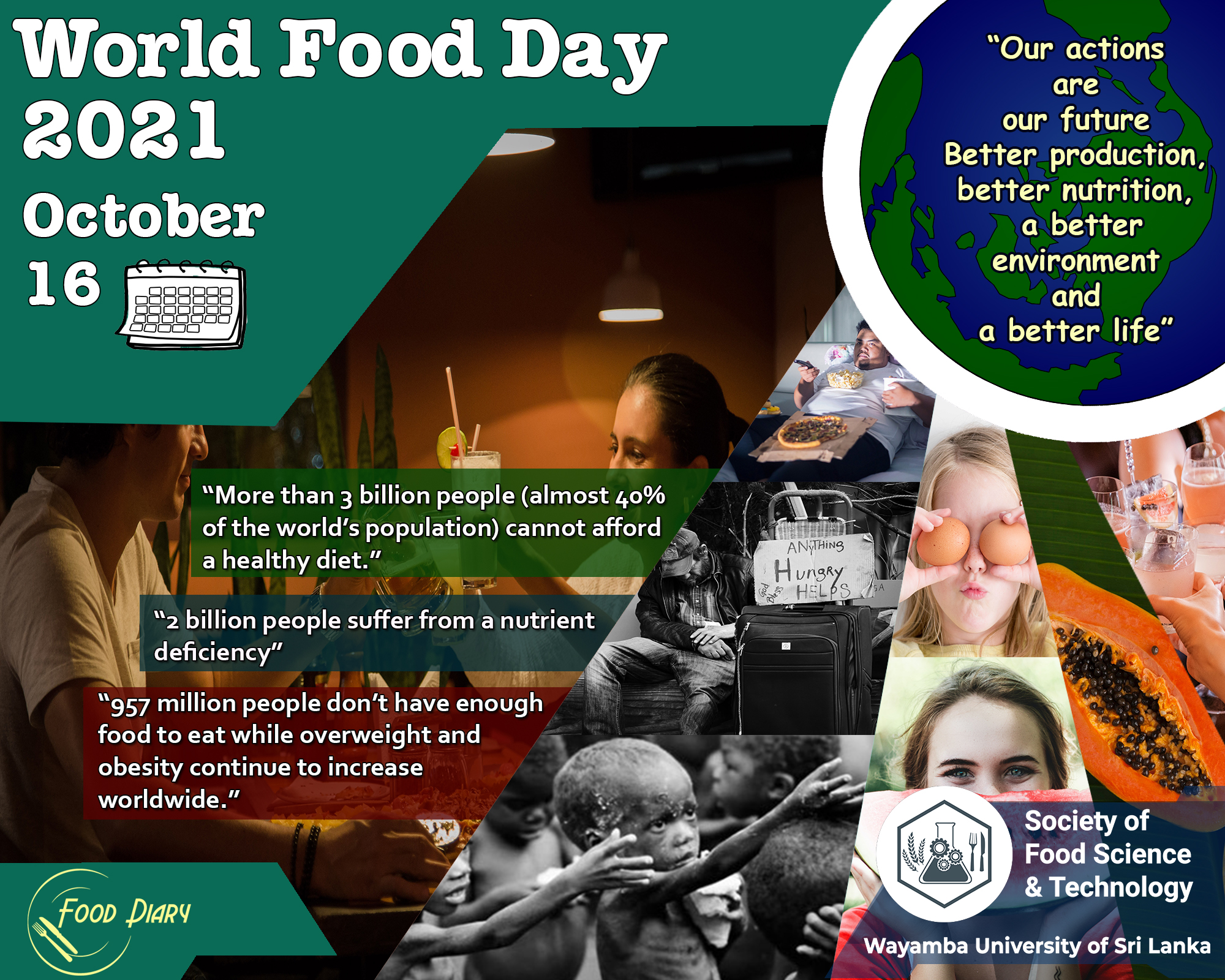
“Our actions are our future- Better production, better nutrition, a better environment and a better life”
World Food Day 2021
“Our actions are our future- Better production, better nutrition, a better environment and a better life”
Every year, the World Food Day is celebrated to appreciate the amazing food we eat, but also it is a day to spread awareness of world hunger. This day is celebrated on October 16, which marks the creation of Food and Agriculture Organization (FAO) in 1945. The main objective of the celebration of World Food Day is to heighten public awareness on the problem of hunger, malnutrition and poverty, as well as focus attention on agriculture and food production. Last year the Norwegian Nobel Committee decided to award the 2020 Nobel Peace Prize to the UN World Food Programme, which provides lifesaving food assistance to millions across the world often in extremely dangerous and hard to access conditions. Food and Agriculture Organization celebrates World Food Day in 2021 with the theme “Our actions are our future-Better production, better nutrition, a better environment and a better life”
“Food” is a noun that we see and use on a daily basis yet, still this day not everyone has access to nutritious food packed with adequate nutrients. For each and every one of us, food tells a story. It started with agriculture and our actions have impacted its journey throughout each step of the way. We have one planet and we are part of one system. We need to reconnect with nature and work as one to build a better future. Let’s rewrite the story of food for a better, more sustainable world. Have you ever wondered what our lives would be without the Agri-food system?
Civilization was built with the intention of easy access to food. Early human ancestors which lived in the forests hunting animals for food evolved because they thought of better ways to get food. They settled near river valleys where there was enough water for cultivation. With food easily available they were able to use their minds to other things. If you think food is an integral part of human evolution. Over the course of time food systems are now more complex. Actually, every time you eat, you participate in this system. The food we choose and the way we prepare, consume and store all are part of this complex system. Every single action inside this system has an influence on the other, every part is connected with each other. But even though the technology is so advanced and humans are evolved on a grand scale there are parts of the world where people are unable to access any kind of food. Many people in the third world are unable to access quality nutritious food. Some people barely survive with the little food they get. With all the technology available and all the knowledge available why humans aren’t able to overcome world hunger as a race of species. The main reason is that the food systems that exist now are not sustainable food systems. These systems were designed to get profits without considering their effect on the environment as well as the human population.
A sustainable agri-food system is one where a variety of sufficient, nutritious and safe foods are available at an affordable price to everyone, and nobody is hungry or suffers from any form of malnutrition. It is the food system that has to be developed in order to overcome world hunger and ensure food security in the world. One-third of the food produced worldwide is lost or wasted. Approximately this is 1.3 billion tons. Imagine in a world where there is no food security, in a world where children die of diseases related to malnutrition,
⭕we are wasting 1.3 billion tons of food.
In 2011 the FAO replaces the food wastage with two indices. The food loss index and the food waste index. Food loss is the decrease in quantity and the quality of food resulting from decisions and actions by food suppliers in the chain, excluding retailers, food service providers and consumers. Food waste refers to the decrease in the quantity and quality of food resulting from decisions and actions by retailers, food service providers and consumers. Just recall your day, are you a contributor to the 1.3 billion tons of food waste?
The world produces enough food to feed the current population. But, more than 3 billion people;
⭕almost 40% of the world’s population cannot afford a healthy diet,
⭕2 billion people suffer from nutrients deficiency,
⭕957 million people don’t have enough food to eat while like overweight and obesity are on the rise.
When the dots are connected, we can clearly see that there are huge flaws in the system. While a certain set of people are privileged enough to waste 1.3 billion tons of food per year, some simply cannot find a single meal to survive a day.
With the new Covid-19 pandemic situation world food insecurity is on the rise. Many people lost their form of income and now they can’t afford adequate healthy food. Mainly countries that did not have stable economic structures face severe problems. Prices of many commodities are skyrocketed and people are unable to bear these prices.
World hunger is soaring under the shadow of COVID-19. As many as 161 million more people faced hunger in 2020 compared to the previous year. World hunger is continuously trending upwards. The world will need to produce 60 % of more food by 2050 to feed the growing population. So, what are the actions that can be taken to make a zero hunger world in future? The solutions to hunger can be short terms actions for relieving hunger today and long term actions for preventing hunger tomorrow. Whatever, those actions should be lasting and sustainable and the right combination of solutions for each individual community.
Climate-smart agriculture is one of the more frequent and longer-lasting solutions that encompasses a number of practices that allow farmers to adapt and become more resilient to less-predictable climates. Responding to forced migration is a key solution for hunger. Refugees and IDPs are some of the most vulnerable groups.
Gender equality is another key solution to global hunger in agriculture and maternal and child health. Food and Agriculture Organization suggest that giving female farmers equal access to resources as their male counterparts could increase production on their farms by 20-30%. Also reducing food waste and disaster risk reduction is essential to manage hunger. Additionally, supporting hygiene and sanitation, controlling infestations and crop infections improve food security and livelihood. With the developing technologies, hunger can be defeated and food safety can be achieved by enhancing crops with biofortification and improving food storage systems.
On World Food Day, it’s our collective responsibility to bring awareness to this issue that’s pervasive across our country and around the world. Sustainability is the key to the future. Without sustainability, we will destroy the planet and along with the planet, we will destroy ourselves. We as the younger generation should be more vigilant about these facts, it’s our future that is at the stake, it is us that will face hunger in future. We have to change the systems that have led this world to its destruction. Invent ways where demand can be fulfilled without any damage to the environment. Taking this world to a place where we can say this world is rid of hunger and malnutrition, the world has achieved 100% food security is our responsibility. It is our responsibility to initiate this on the World food day.
References;
https://www.concernusa.org/story/solutions-to-hunger/
https://www.fao.org/brussels/news/detail/en/c/1416785/
https://www.fao.org/world-food-day/about/en/
Article by: Ashani Rathnathunga & Parami Chandrasiri
Society of Food Science and Technology
Wayamba University of Sri Lanka
